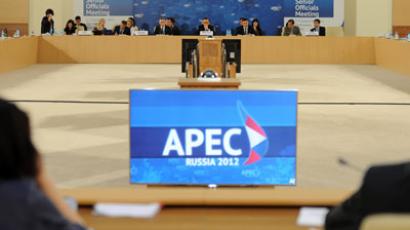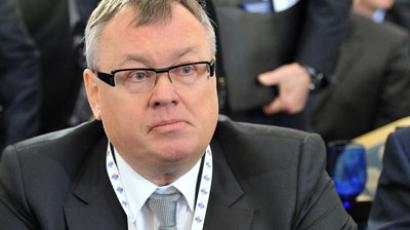‘Russia key to sustainable growth in Asia’ - RUSAL's CEO
The growing middle class in Asia is consuming more, increasing the demand for resources and putting a strain on local production. Aluminum industry company RUSAL’s CEO Oleg Deripaska argues Russia is part of the solution in Asia.
“Without Russia there is no solution for sustainable growth in Asia”, he told RT on the sidelines of the Asia-Pacific Economic Cooperation Forum in Russia's Vladivostok. In the future it “will be way more competitive than Australia, Africa, or Middle East.”Russia is able to supply Asia with everything from “drinking water and agriculture products,” to “processed food”.Deripaska also spoke about the EU crisis and the monetary reforms the eurozone needs to implement, such as “lowering” the value of the euro and making it more “flexible”, in order to become more competitive in the global market. Either way, Deripaska firmly believes the euro will survive as a single currency. He adds that China’s role as a global player cannot be ignored either. The West has misinterpreted China’s economy as losing efficiency, but in reality it is just in a “slow transition” to improvement. “Analysts who have never been in China just read data,” but to understand China “you really need to be in, really need to cooperate on a daily basis with the people,” argues Deripaska.RT: Do you expect a second wave of the crisis?Oleg Deripaska: Not really, I do believe that we will have prolong[ed] soft period of demand and it is based on fears among investors, misinterpretation what is going on in China. It is not clear for many what…[the] outcome in [the] US battle in presidential elections [will be]. These are uncertainties, which prevent investor[s] to build something in the long-term and [they] base everything on short-term. It doesn’t look positive and that is why we’ve seen demand staying soft.RT:This misrepresentation of what is going on in China. What do you mean?OD: We have a…growing economy, which demonstrated unbelievable growth rate for the past 30 years. And of course now, in the face of transition, not just political transition, which affects efficiency of state institutions, but also a transition in terms of how they manage state-owned enterprise – what is the relation with the region, what is the core industry, how to implement energy-efficiency plane, how to implement environmental program? And of course this transition is slow. And I think no one [could] read it as decline or China’s loss of efficiency. No, it is just a transition to be more healthy and efficient. RT:Do you think China is misrepresented in the Western media sometimes?OD: Yes, exactly. We have a lot of analysts who have never been in China who just read data and try to build analogy on what they understand as going on in US or in Europe. And you really need to be in, really need to work on this matter, you really to cooperate on a daily basis with the people. RT: Do you think this is because Western biased against East – Russia, China and other countries?OD: It is just in a run for sensational results, numbers. No one wants to [look] deeper, no one wants to see what is behind any action. It [has] done a lot of bad things in the past. No one has seen how China made its way. And also it may be wrong now, because it may create a wrong signal for investors.RT:What has your company done to prepare for the worst?OD: We do whatever you need to do to stay competitive. To focus on our customer, to understand what…their plan [is] for next year, next quarter, next week. What sort of new products they may demand, what is the opportunity for us to offer to them a new product, new solution? It is the only way. RT:Your core businesses are heavily exposed to the European Union and China is now self-sufficient in aluminum. Do you have a Plan B?OD: Aluminum is [a] commodity. It is like oil, copper, any commodity. We still have side effects from 2008-09 because it is a continuous production. And if you have a quarter or two quarters, or three quarters, you have increased stock. And we have now increased stock [in] aluminum warehouses and it sends a wrong signal for the players in the market. But the growth in 2011 in terms of demand and consumption shows that aluminum is [an] important material and we will see a better future. But industry needs discipline and proper [caps] in terms of output, maybe 5 or even 10 per cent will create a better situation in terms [that] it will adjust the stock and we will create a proper signal for our customers, for investors and create opportunities for modernization. RT:How should EU reform to survive?OD: It is very political, with ambition, with social policy. The only way they need to revise monetary policy in terms of how heavy the euro should be because [the] euro is too heavy. Completely out of real balance of trade, real competitiveness of European operation and now [the] euro [is] on a level even to parity with [the] dollar. I think it is great opportunity to think through [a] solution to the crisis, because it is a moment in heavy currency and it will not give the opportunity to grow. [The] euro is way too heavy. RT:Can you give an example on how to EU is not competitive?OD: In construction, in [the] housing market the demand is almost at the level of zero. Why? Because it is too high cost. If you would try to measure and compare with different regions and demand for European product, export opportunity, especially for the [southern economies], cost of doing business for the [southern economies] with a heavy euro. They got this tremendous benefit to have this huge platform of European monetary union. But at the same time they got a huge problem with high costs, salaries and politically they couldn’t find the way because you need to cut wages, put pressures on the budget spending and there is no one who would withhold this. Politicians don’t want to make economy more efficient. Politicians wouldn’t know from the business side, they want to make their terms longer. This is a bargain solution – make [the] euro float and reach a level which will show they become more competitive. RT:Is the euro not a free-floating currency?OD: It is a free-floating, but it is wrong in ECB policy. RT:What ECB policy is wrong?OD: Because they tighten supply. They have done recently some steps. And of course it is creating a wrong signal in the currency market.RT: Will the euro survive as a single currency. OD: No doubt. RT: The talk of Russia diversifying to Asia-Pacific. Asia is destined to be China’s resource supplier, but is there a greater role?OD: Without Russia there is no solution for sustainable growth in Asia, not just in China. And it is not just resources where we will be way more competitive than Australia, Africa, or Middle East. There is no doubt. It is not about opportunity for production of semi-product or manufacturing in the user-industry sources. We also will be more competitive in medium-term between anyone who would like to supply to Asia. [The] Russian East is most important for agriculture solution and for water solution. It is not just energy. [It’s] also how to make life easier for Asian countries. We can use our resources to help Asia to grow and attract Asian investment to diversify our economy in general terms. RT: Do you mean that Russia can feed Asia and provide them with drinking water?OD: Everything, drinking water, agriculture products, processed food. RT: What needs to happen for Russia to become more competitive?OD: Infrastructure, tax regime, we believe there needs to be a proper adjustment in monetary policy by [the] Russian Central Bank. We need more financial institutions in [the] Eastern part of Russia and of course we need to open. [The] Russian economy is open already, but we need to welcome more investors, to help them settle in their plans, to make more efforts to train people not just in basic skills, but also language and communication. RT:What is needed to restore Russia’s reputation as a place to do business?OD: Do business not talks. Focus on business, try to be more efficient, help your clients, help the investor to understand better what the risks are, and openly talk about the risks. I think that is the best way to promote Russia. RT: Is there too much state control of Russia’s economy?OD: There is a lot of state-controlled enterprise. And I think Russia needs to release these resources to the private sector.RT:World aluminum output is expected to fall this year. What percentage do you think it could fall?OD: Difficult to say – up to 4.5 million tonnes on efficient capacity will be definitely shut down and it is unclear how much will be put on in a new capacity. RT:What about China’s aluminum consumption? Could it rise this year?OD: It will definitely around 9-10 per cent this year. It is growing. RT:What about global consumption. Can it rise by 7 per cent thanks to China?OD: Maybe 6 to 7 per cent.














